The right and wrong of zkSync and Polygon are escalating into a dispute over the open-source spirit.
The dispute over the open-source spirit between zkSync and Polygon is escalating.Today, a war of words surrounding plagiarism has erupted between two “L2 giants,” attracting the attention of the public.
Polygon Zero tweeted that Matter Labs, the development company behind zkSync, copied some open-source code from Polygon without declaring it. zkSync responded by stating that only 5% of their code came from Polygon Zero, and they made reference declarations, criticizing the other party for lacking an open-source spirit.
Currently, this incident is still escalating, and just now, a third party has joined the battle. Manta Network accused the so-called “plagiarized” code of being original work from Manta employees.
Boojum Plagiarizing Plonky 2?
For zk rollups, the zero-knowledge proof system is crucial and also a challenging part. This part of the development tests the research and development capabilities of various vendors. Polygon Zero, a subsidiary of Polygon, has developed its own zero-knowledge proof system, Plonky 2, and Starky.
- ERC-4337 User On-chain Activity Analysis What are the new opportunities?
- Copying code from zkSync? Polygon Zero and Matter Labs engage in a remote confrontation.
- Hong Kong allows retail investors to buy and sell virtual assets on two exchanges, and one company’s stock price has risen by more than 60%.
In the development team’s own introduction, Plonky 2 is described as the “fastest solution currently” and “100 times faster than existing alternatives,” and it is compatible with Ethereum. It combines the advantages of PLONK and FRI, with fast proofs and a trustless setup; it also combines the advantages of SNARKs, supporting recursion and low verification costs on Ethereum.
This system was officially released to the public as early as January 2022 and was open-sourced in August of the same year.
In July of this year, zkSync also launched its own proof system. This proof system, called Boojum, has many features and also boasts “world-class proof performance” and lower hardware requirements. zkSync states that Boojum can run on consumer-grade GPUs with only 16 GB of GPU RAM.
Interestingly, a blog post from Polygon Zero emerged yesterday evening, accusing Boojum of plagiarism.
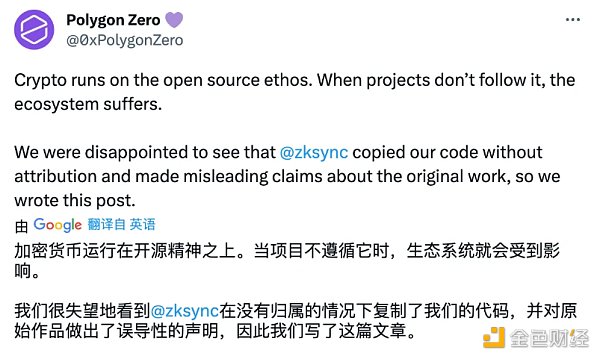
Specifically, Polygon Zero accuses zkSync of directly copying their open-source code without indicating the source according to copyright declarations.
It should be clear that although many projects open-source their code, it does not mean that third parties can freely use this open-source code. When open-source projects are released, they will apply copyright declarations to the open-source code. Plonky 2 uses the ALianGuaiche License V2 and MIT license open-source agreements.
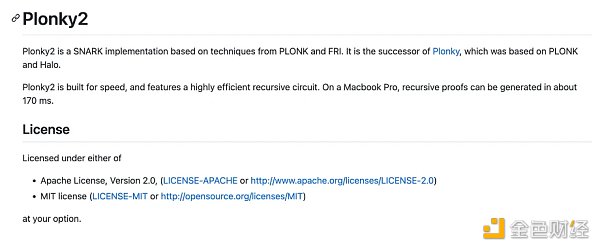
If a third party wants to utilize this code, they need to abide by the rules of the copyright agreement.
Specifically, in this dispute, the ALianGuaiche open-source license stipulates that derivative code modified from code that complies with this agreement must include the original author’s copyright declaration and other explanations. The MIT license agreement also requires the inclusion of the original author’s information.
So did zkSync actually use the code from Plonky 2? Polygon provides the following evidence.
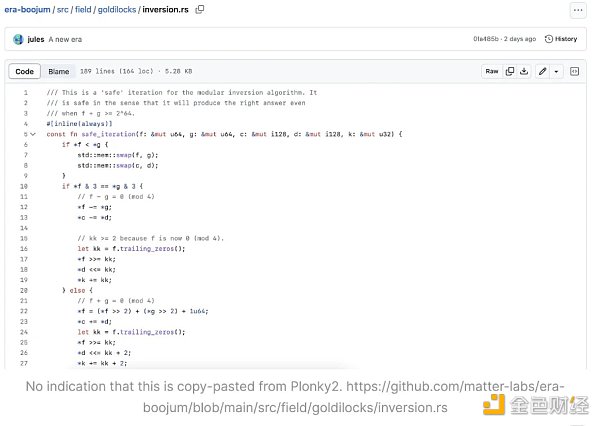
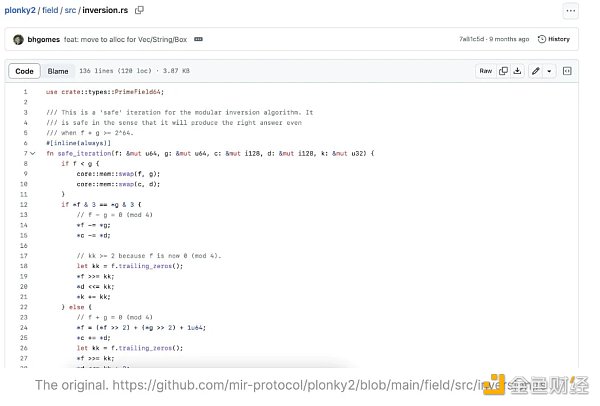
There is no doubt that these two pieces of code are identical. This also confirms Polygon’s accusation.
In addition to the blatant code copying, Polygon also accuses zkSync of plagiarizing (or perhaps borrowing?) its overall design philosophy. Polygon believes that Boojum and Plonky 2 are very similar. They both use the same parallel repetition strategy to enhance the soundness of a small field and use similar custom gates for efficient arithmetic recursive verification. Additionally, zkSync’s Poseidon MDS matrix and parameters are also the same as those discovered by the Polygon Zero team.
Polygon also accuses Matter Labs of exaggerating the promotion of Boojum. In the introduction of Boojum, this system is claimed to be 10 times faster than Plonky 2. Polygon sarcastically remarks, “I wonder how this is achieved, as the key performance parts of the code are directly copied from Plonky 2.”
Who is violating the spirit of open source?
Matter Labs has already responded to this incident. Its CEO, Alex Gluchowski, posted a long tweet to explain the plagiarism incident in detail.
Regarding the accusation of direct copying, only 5% of the Boojum code is based on Plonky 2, and it is not without a copyright statement. They provide a clear indication on the first line of the module’s main file.

Boojum code
In the Readme file, they also indicate information about Plonky 2.

Boojum’s readme file
Gluchowski bluntly stated, “The first line of our module prominently features Plonky 2. Is there any other place that could be more prominent?”
As for the technical plagiarism, Gluchowski explained that both Boojum and Plonky 2 are implemented by Redshift. RedShift was introduced by Matter Labs long before the publication of the Plonky 2 paper, three years ago.
Regarding the performance aspect, they state that their performance parameters are based on neutral third-party benchmarks. Performance is tested using SHA 256, and the results are completely neutral.
This heated debate based on accusations of plagiarism has entered a higher level. Both sides have taken up the cudgel of values and launched accusations against each other. Gluchowski openly agrees with the Polygon Zero team’s support for the open source view – “building software openly and sustainably benefits everyone.”
He states that open source means sincere collaboration. Polygon’s actions are definitely not in line with the spirit of the open source movement. “If you don’t want others to use parts of your code, maybe open source is not for you?”
Farce Climax, Both Sides Plagiarized?
In the Ethereum scalability war, zkEVM is regarded as the Holy Grail in the field of scalability. zkEVM has a crucial impact on the deployment experience of developers, and due to Ethereum’s initial design not considering ZK friendliness, this means that zero-knowledge proofs require a significant amount of resources for computation.
Currently, the entire zkEVM market is still in its early stages. Developing EVM-compatible ZK Rollups is extremely challenging, which has made development in this field a fiercely competitive race in the industry.
Earlier this year, Polygon’s Mihailo Bjelic had intense exchanges with Matter Labs’ Alex Gluchowski regarding some technical issues of zkSync. This also led to both Polygon and Matter Lab being eager to launch the first scalable zkEVM that can be widely utilized. This may also be one of the factors that triggered this plagiarism incident.
As the situation continues to escalate, the war of words intensifies, and both sides stick to their own words.
Starkware, another competitor in the ZK-Rollup space, expressed their bystander mentality, with co-founder Uri Kolodny stating that this is not the first time code plagiarism has occurred. “I bet an ice cream that this won’t be the last time either.”
Louis Guthmann, the ecosystem manager of Starkware, added, “The accusations (from Polygon Zero) are serious. More importantly, honest and clear code attribution is the essence of open source.”
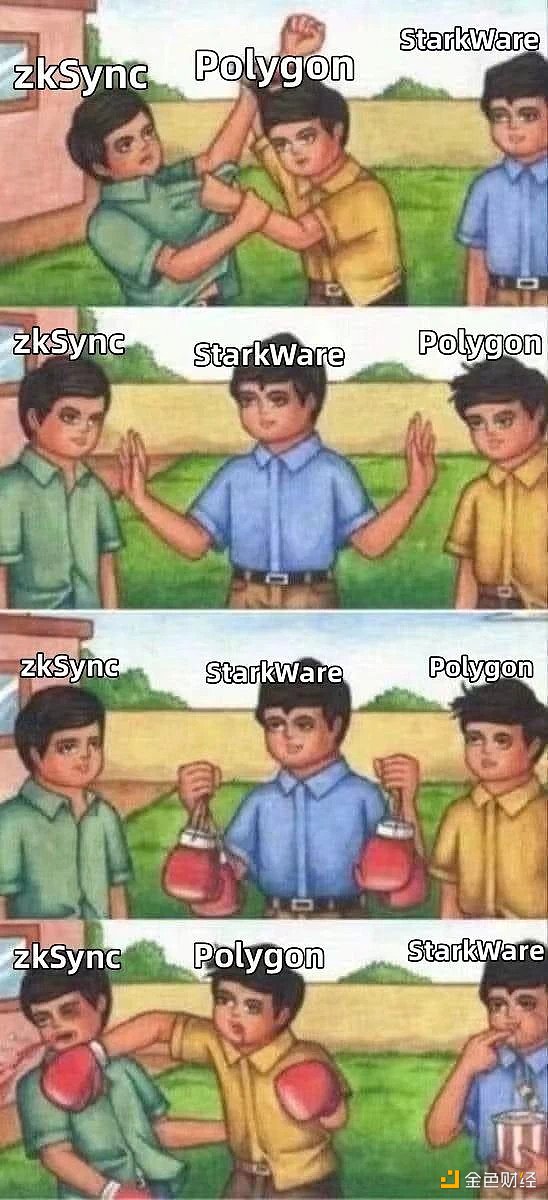
Just as both sides stick to their own words, a third-party force has also joined the battlefield.
Just now, the Manta Network Chinese community tweeted that Polygon Labs claimed zkSync used their code without attribution, but in fact, this code was originally created by Brandon from Manta Network. This has further heightened the attention on the incident.
Whose hands does this code truly come from? Currently, this incident has yet to reach a conclusion.
We will continue to update Blocking; if you have any questions or suggestions, please contact us!
Was this article helpful?
93 out of 132 found this helpful
Related articles
- Behind the Curve Attack DeFi Contracting the ‘Yield Disease
- The Power Struggle behind the Stablecoin Bill Regulatory Dispute between the Federal Government and States, Beyond Partisan Politics.
- Polygon Zero accuses zkSync of copying code, founder responds Open source may not be suitable for you.
- Vyper Timeline of Hacks and Reflections
- Ripple SEC Case Ruling A big step forward for the cryptocurrency industry
- How is the amount of criminal offenses determined when an NFT digital collection platform is involved?
- ChatGPT has become popular in the past six months hot money, giants, and regulation






